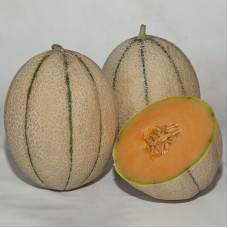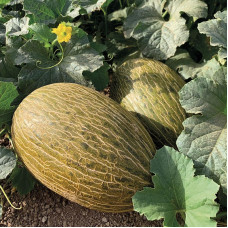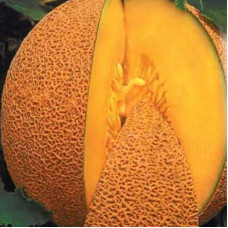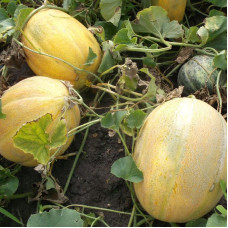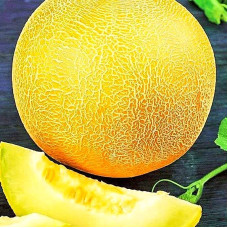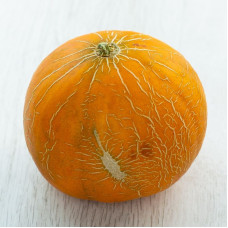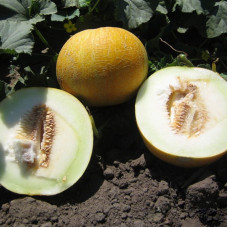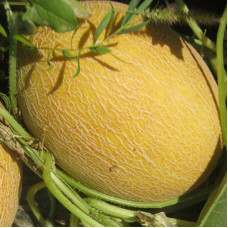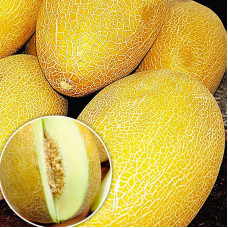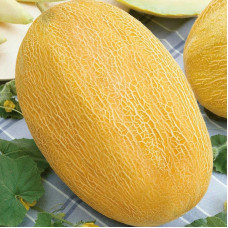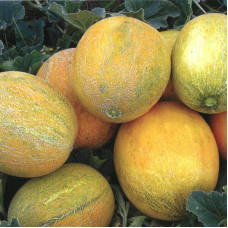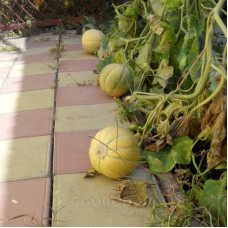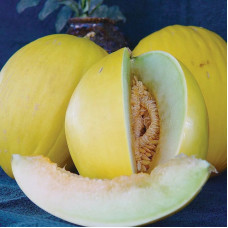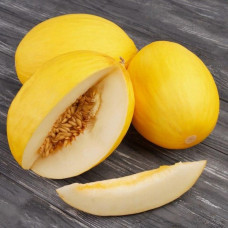In stock
Product Code: 15685
Melon «Massimo» F1» - mid-early high-yielding hybrid melon. The plant is powerful, vigorous. The fruits have attractive orange pulp, are uniform and weigh 1.5-2 kg. The hybrid is characterized by a high sugar content.
The plant is resistant to pow..
$4.99
In stock
Product Code: 15684
Melon «Macabeo» F1 - mid-season, high-yielding hybrid. Type Piel de Sapo. The plant is stress-resistant and has very good growth energy. Fruit weight is up to 2.5 kg. A characteristic advantage is the high sugar content.
The hybrid has good shelf ..
$4.99
In stock
Product Code: 15654
Melon «Honey aroma» F1 - is a mid-early hybrid of Dutch selection. Plant of medium vigor. The fruits are round with a mesh skin, yellowish-brown in color, attractive in appearance, weighing 1-1.2 kg. The pulp is juicy, tender, orange in color, w..
$0.99
In stock
Product Code: 4677
Melon «Ortolani» - is an early high-yielding variety. The growing season is 70 days. The fruits are oval-round, dark green in color, weighing 1.6-2.0 kg. The pulp is orange-pink in color, tender, juicy, aromatic, and has high taste. Has a high sugar ..
$0.99
In stock
Product Code: 13557
Melon «Dubivka»
One of the most popular ultra-early varieties. The growing season is 60 days. The fruits are round-oval, the pulp is thick, sweet, very fragrant. Fruit weight 0.7-1.1 kg.
The variety is transportable, resistant to bacteriosis an..
$0.99
In stock
Product Code: 13128
Дыня «Ранняя 133»
Раннеспелый сорт дыни. От всходов до созревания - 65-70 дней. Плоды округлой формы, светло-оранжевого цвета с выраженной сеткой. Мякоть белого цвета, средней толщины (3-4 см), нежная, сочная, сладкая. Масса плода 1,6-1,8 кг. Усто..
$0.99
In stock
Product Code: 12117
Melon «Fantasy»
Mid-season, high-yielding variety. The period from full shoots to the first harvest of fruits is 69-83 days.
The plant is climbing. The fruit is elliptical, yellow, smooth, of medium thickness and medium dense mesh. Fruit weight..
$0.99
In stock
Product Code: 12116
Melon «Didona»
Medium-early variety, relatively resistant to powdery mildew and bacteriosis, intended for fresh consumption and processing. From germination to the beginning of fruit ripening 70-75 days.
The fruits are spherical and obtusely el..
$0.99
In stock
Product Code: 437
Melon «Tavrichanka» - is an early variety. From germination to first harvest – 65-70 days. Fruit weight is 1.8-2.0 kg. One of the most delicious varieties. Sugar content up to 12%. Productivity is high. Transportability is very good. The fruits do no..
$0.99
In stock
Product Code: 15175
Melon «Collective Farmer»
The variety is mid-season, the fruits ripen 73-90 days after germination. Scourge of medium length. The fruits are spherical with a hard bark, yellow-orange. The average weight of the fetus is up to 1 kg. The pulp is thin..
$0.99
In stock
Product Code: 11785
Melon «Honey tale» - is a mid-early variety, the period from full germination to the first harvest of fruit is 75-85 days. The plant is medium-climbing. The fruits are round, weighing 2-4 kg. The pulp is very tasty, tender, fabulously sweet and aroma..
$0.99
In stock
Product Code: 11933
Melon «Piel de Sapo»
Literally translated “toad skin”, it is so named for the similarity in the color of the fruit. It is a rare variety native to the Canary Islands, with a characteristic uneven dark green skin with yellow stripes and "cracks". S..
$0.99
In stock
Product Code: 12118
Melon «Prestige»
Early ripe variety, 65 days to harvest. A plant of the average size, with long lashes. The fruit is oval, weighing 2-2.6 kg.
Fruit surface densely reticulated, bright yellow to orange. The flesh is white, 2.5-3 cm thick, ..
$0.99
In stock
Product Code: 14949
Melon «Credo» F1
It is a very early and stable hybrid, which is classified as "Pineapple". The fruit is oval, attractive, homogeneous, has a large size and a pronounced mesh on the skin. The flesh is white and has a strong aroma. The weight of one..
$0.99
In stock
Product Code: 10836
Melon «Pineapple»
Mid-season melon variety. Vegetation period 80-90 days. Fruits are oval, weighing 1.5-2.5 kg, yellow-green thin skin. The flesh is white-yellow, juicy, aromatic with an excellent taste inherent in this variety.
Melon «Pineappl..
$0.99
In stock
Product Code: 11788
Melon «Sweet pineapple»
Early maturing (from germination to fruiting 65-70 days) variety. Oval-shaped fruits, golden-orange with a mesh surface, weighing 1.8-2.0 kg. The flesh is white with a pink tint, very sweet.
Variety value: fast return of..
$0.99
In stock
Product Code: 10835
Melon «Alushta»
Fruits with very fragrant and tender white pulp. The fruits are yellow, have an oval shape with a slightly bumpy skin, but at the same time thin and elastic, can reach 2.5 kilograms in weight.
This variety has an average ripenin..
$0.99
In stock
Product Code: 8699
Melon «Dana»
Highly productive mid-season (89-91 days) melon variety. The fruits are oval, weighing 2-3.5 kg, with a yellow-orange mesh peel. The pulp is very sweet, juicy, fragrant, thick, tender, cream-colored.
It is resistant to powdery mild..
$0.99
In stock
Product Code: 11275
Melon «Krynychanka»
Disease resistant. Early maturing variety. The plant is long-branched. The fruit is oval with a smooth surface, yellow-orange, weighing 2-2.5 kg. The peel is thin, the flesh is white or pale cream, soft-grained, sweet.
The v..
$0.99
In stock
Product Code: 9253
Melon «Amal»
This is an early ripe variety popular among sellers of finished products. Vegetation period from germination to technical maturity is 70-80 days.
The fruits are oval, weighing 2-3 kg (sometimes up to 4 kg), with a large, pron..
$0.99
In stock
Product Code: 8432
Melon «Cantaloupe» (Thai melon) / Cucumis melo var. cantalupensis
Mid-season variety for open ground and film greenhouses. This variety of melon is very demanding on heat.
Melons of medium size (1-5 kg), round shape. The surface of the fruit is..
$0.99
In stock
Product Code: 15174
Melon «Cossacks»
Early, productive variety. Ripens 70 days after germination. Medium climbing. Fruits are round-oval, medium size, yellow-green, weighing 2-3 kg. The peel is thin, the flesh is light cream, high taste. Sugars in fruits 7.7 - 8.1%...
$0.99
In stock
Product Code: 13914
Vietnamese melon «Gift from Ho Chi Minh Grandpa»
This heat-loving plant does not tolerate high humidity, but it perceives an abundance of light well. Refers to early-ripening varieties, comes into fruiting on the 35th day after germination.
The..
$0.99
In stock
Product Code: 11786
Melon «Mead» F1
Early ripe (60-70 days) hybrid for growing in open and protected ground, with a garter to trellises and forming into one stem. 3-5 fruits ripen on one plant. The fruits are small, rounded or slightly flattened, leveled, greenish-ye..
$0.99
Melon seeds: what they are
Melon seeds are quite popular among modern gardeners. This agricultural crop pleases with sweet juicy fruits, which are admired by both adults and children. Today, hundreds of varieties of such a plant have been bred, each of which has its admirers all over the world. The melon itself is usually consumed raw, its pulp is used for making cocktails, ice cream and similar sweets. Its seeds have received no less distribution in folk medicine.
Among all melon seeds, two of its varieties were determined:
Among all melon seeds, two of its varieties were determined:
- Pineapple variety. This melon has an oval elongated shape and a relatively smooth surface. Its flesh is white and aromatic. Fruit juiciness is also quite high. The weight of one such hybrid can reach more than two kilograms. The skin of the fruit is thin, yellowish-green in color. The pineapple variety suggests very sweet fruits that are suitable for preparing all kinds of desserts and for individual consumption.
- Melon Seed Variety— Italian mesh is not too familiar to the buyer. Such a melon is visually similar to a pumpkin. Its color is not too bright, but rather faded. The aroma is pronounced, the taste – rich, sweet. It is divided into several segments and looks like it is divided into slices. The peel is of medium thickness, covered with a small mesh. Melon shape – rounded.
Melon – it is not just a tasty fruit that most gourmets admire. Its seeds have some useful properties, which in many ways attract fans of alternative medicine. For example, there is an opinion that the seeds of such a plant culture are very useful for potency and help maintain it in excellent condition.
The thing is that melon contains many useful vitamins and minerals. So, it contains vitamins E, PP, A, B1, B2, B5, B6, B9, beta-carotene, ascorbic acid. It also contains calcium, magnesium, sodium, potassium, phosphorus, sulfur, chlorine. Not without such trace elements as iron, silicon, zinc, iodine, copper, manganese, fluorine, cobalt. All the above elements have an exceptionally favorable effect on the health of the one who eats fruits and even melon seeds. Just one piece of this fruit will not only bring a sea of taste sensations, but also incredible benefits to the body.
How to choose and plant melon seeds
It is worth considering that each melon seed variety has its own individual characteristics. The rules for planting a plant, the speed of its growth and many other factors depend on the variety. Therefore, the main selection criterion should be a specific variety of such a plant. The most popular among gardeners is the Amal variety. It gives delicious fragrant fruits with increased juiciness. Amal is the most popular melon variety, so it is cultivated both on a private and industrial scale.
The process of selecting the optimal manufacturer deserves no less attention. To do this, it is worth studying the reviews of previous buyers. They will talk about whether each seed can sprout. This is the key factor in determining the quality of the purchased planting material.
Particular attention is paid to planting. The yield directly depends on the correct planting. Melon seeds should be placed exclusively in open ground, preferably in fertile and micronutrient-rich soil. Nevertheless, some varieties grow well on unenriched land. Before planting seeds, it is strongly recommended to introduce a significant amount of humus into the ground. This increases the likelihood of a richer harvest. Three or four seeds should be placed in one planting hole about five centimeters deep.
Under normal conditions, melon seeds begin to grow ten days after planting. The growth rate of a plant is individual and depends on the characteristics of a particular variety. This plant culture needs abundant watering with moderate frequency. In this case, the gardener will be able to enjoy large fruits with excellent taste.
The process of selecting the optimal manufacturer deserves no less attention. To do this, it is worth studying the reviews of previous buyers. They will talk about whether each seed can sprout. This is the key factor in determining the quality of the purchased planting material.
Particular attention is paid to planting. The yield directly depends on the correct planting. Melon seeds should be placed exclusively in open ground, preferably in fertile and micronutrient-rich soil. Nevertheless, some varieties grow well on unenriched land. Before planting seeds, it is strongly recommended to introduce a significant amount of humus into the ground. This increases the likelihood of a richer harvest. Three or four seeds should be placed in one planting hole about five centimeters deep.
Under normal conditions, melon seeds begin to grow ten days after planting. The growth rate of a plant is individual and depends on the characteristics of a particular variety. This plant culture needs abundant watering with moderate frequency. In this case, the gardener will be able to enjoy large fruits with excellent taste.

